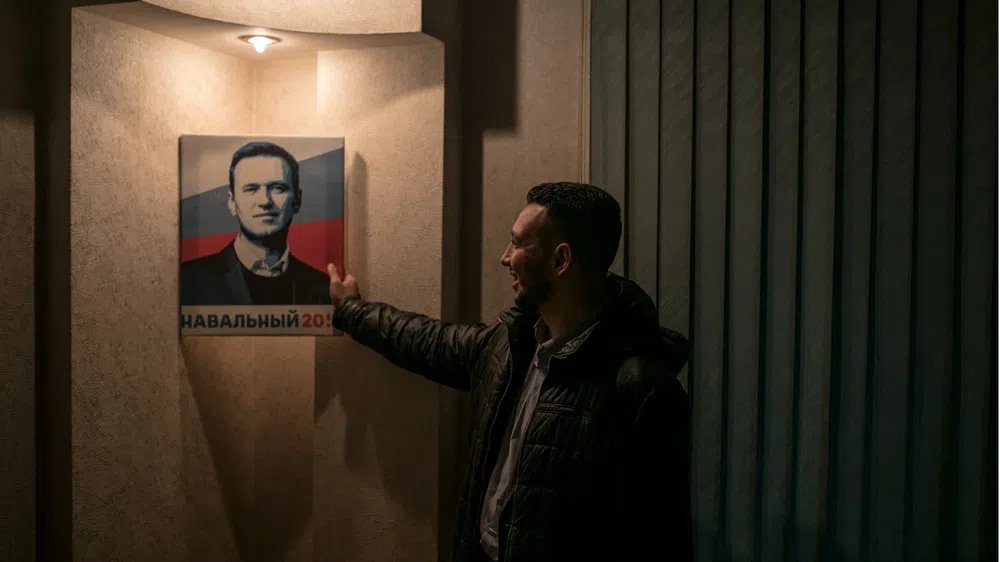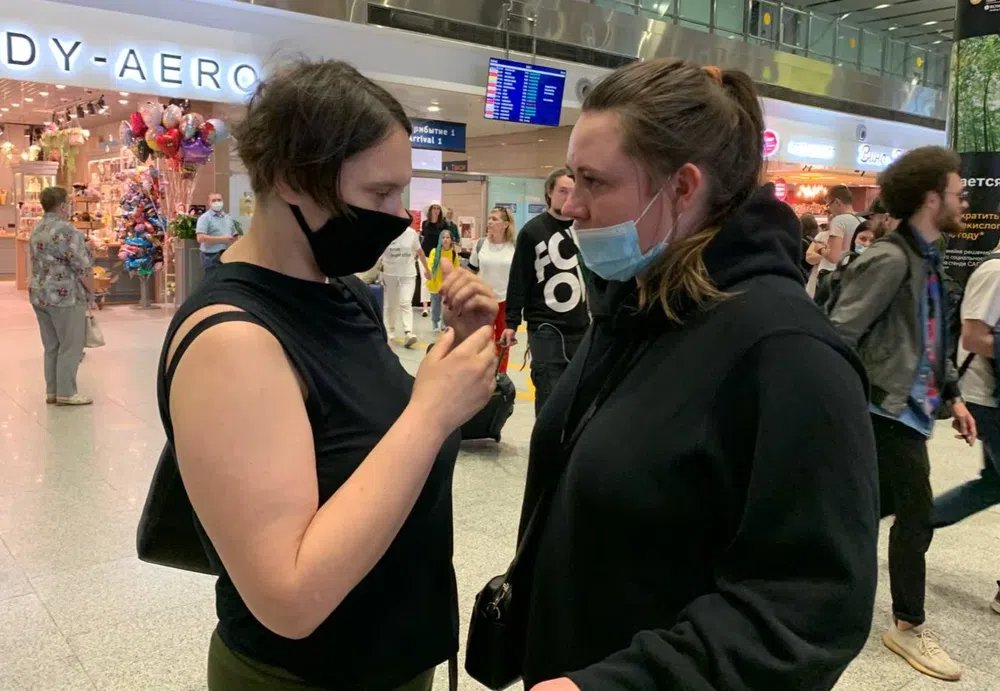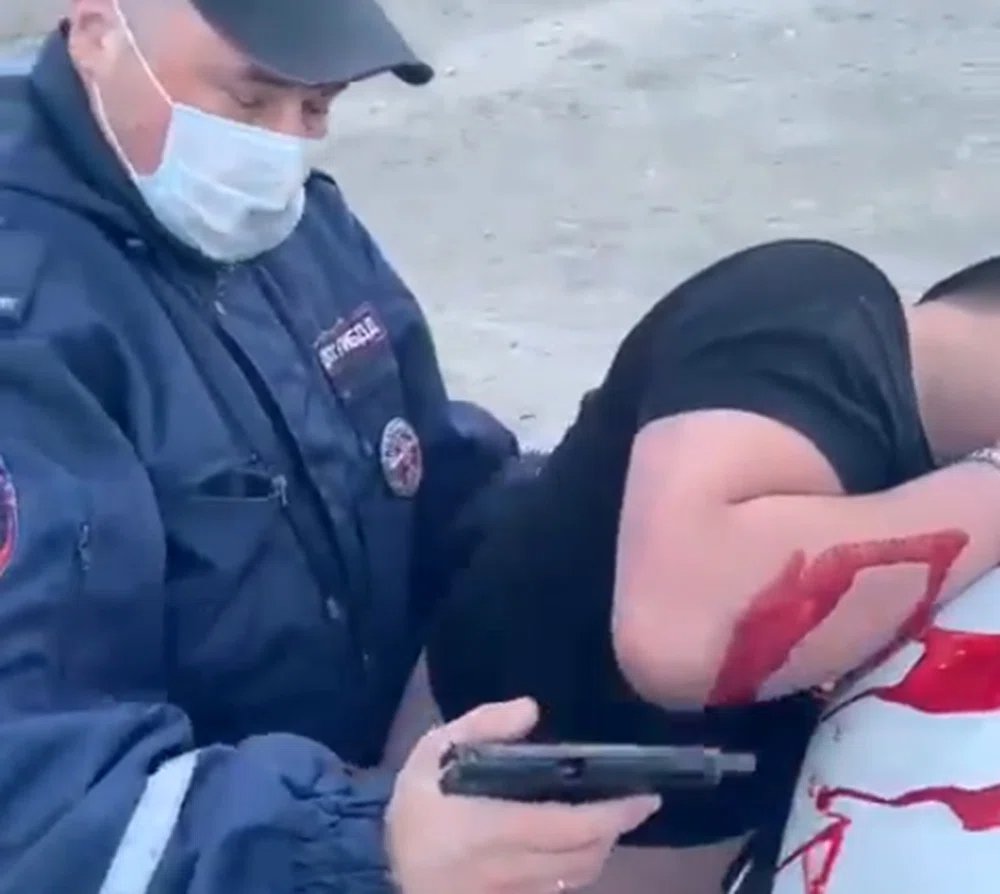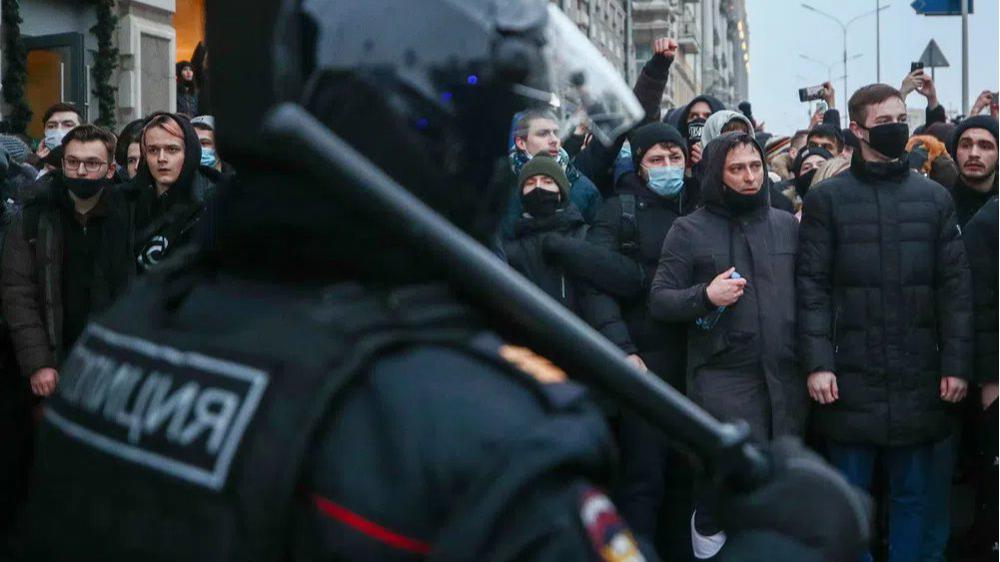Here what’s in store for you this week:
- The Kremlin’s crackdown on anti-corruption organizations is much larger than Navalny’s fund;
- Government forces raid a safehouse for victims of domestic violence, kidnapping a young queer woman;
- On the ongoing theme of authoritarian violence, we also explain the nature of Russian police brutality;
- Plus, Novaya explains seven years of Kremlin mistakes in the ongoing Russia-Ukraine war.
Want to get the full story? Click the links below for full-length articles in Russian.
Crackdown on Anti-Corruption Orgs, Explained
Russian officials labeling Alexei Navalny's Anti-Corruption Foundation (FBK) and the Citizens' Rights Protection Organization as 'extremist' made global headlines. The ruling by a Moscow court, backed by the government, places organizations of imprisoned opposition leader Navalny on the same level as ISIS. This means that cooperating with them and providing or receiving financial assistance are now both illegal. But what global headlines haven't captured is that the crackdown extends well beyond Navalny's organizations. Our judicial correspondent Andrey Karev reports.
CRACKDOWN UNDER THE COVER OF URGENCY AND SECRECY. The press was not allowed to witness the trial, Karev reports. He says that all case materials were classified despite the sheer volume of them, and "the judge was in a rush to make a decision." FBK lawyers for the defense "repeatedly requested a recess to at least drink some water, but this was refused by the judge."
HARSH NEW REPRESSIVE LAWS. The court decision, which said FBK created conditions for "destabilizing the social and sociopolitical situation," launched a domino effect of a broader crackdown. It resulted in an entire package of laws against FBK and fast-tracked measures against any organization members declared 'extremist.' Putin signed new regulations last week.
AMONG THE FRESH LEGISLATION IS A BAN ON PEOPLE PARTICIPATING IN ELECTIONS IF THEY ARE INVOLVED IN 'EXTREMIST' ORGANIZATIONS. There is also a new fine that can be imposed against people, even displaying support for such "extremist" organizations on social media. Cooperating with "undesirable organizations" is also set to be deemed a crime, with "cooperation" including attending press conferences or seminars, as well as making financial donations.

WHAT DOES IT MEAN IN PRACTICE? Russian officials already use exceptionally wide and vague definitions of 'extremist' to target dissent or government criticism. This makes their job even easier.
WORDS OF CONDEMNATION FROM ABROAD, BUT NO ACTION. The international community has slammed the new laws with the US State Department saying, "Russia has effectively criminalized one of the country's few remaining independent political movements," and the UK government terming the situation "another Kafka-esque attack on those standing up against corruption and for open societies, and is a deliberate attempt to effectively outlaw genuine political opposition." But, despite harsh rhetoric by the US government, the new crackdown hasn't affected Biden's plan to stroke Putin's ego and meet with him face-to-face in Geneva this week.
NEW LEGISLATION WILL AFFECT NOT ONLY CIVIL SOCIETY ORGANIZATIONS, BUT ALSO ALL RUSSIAN CITIZENS warns our columnist Leonid Nikitinsky.
"The law will deprive millions of Russians of active suffrage: there simply will be no candidates to choose between, we are being deprived of the hope of being represented in 'representative bodies," he writes.
LONGLINE OF CRACKDOWNS. Navalny's network of regional branches shut down its operations in April in anticipation of the new ruling. But FBK isn't the only organization to have suffered from new laws. Mikhail Khodorkovsky's Russia Foundation closed down offices in the country in May. The former project's head, Andrei Pivovarov, got arrested and faces jail time. The vast, ridiculous legal framework of cracking down on such figures is selective and arbitrary. The Kremlin 'has stopped even pretending that a vague set of rules or laws exist, or even work,' Nikitinsky writes.
BACKSTORY. Navalny's Anti-Corruption Foundation has been responsible for exposing graft inside large swathes of Russia's ruling elite in recent years. This included an exposé on Putin's lavish palace. However, before being labeled 'extremist,' it was also targeted with repressive 'foreign agent laws.' A 'foreign agent' concept first appeared in Russian legislation in 2012 as an amendment to Russia's nonprofit law. They stipulated that nonprofit organizations that receive foreign funding and participate in political activities must identify themselves as 'foreign agents.' But the definition of 'political activity' is very broad, meaning that it extends to a wide variety of organizations, including environmental or animal rights groups, that aren't engaged in explicitly political activity. Meanwhile, domestic funding in Russia is limited, and the Russian state wouldn't give grants to many of these organizations anyway due to their work's critical nature. As a result, these organizations are forced to seek support abroad and risk being labeled a 'foreign agent,' leaving them open to harassment and intimidation.
Read Karev’s report in full here.
LGBTQ+ ‘Safe House’ Raided, Women Kidnapped
On June 11, Russian police stormed a "safe house" for queer women in Makhachkala, the capital of autonomous region Dagestan in southern Russia. The center helps people in crisis, specifically victims of domestic violence. Officials kidnapped two women, 22-year-old Taramova Khalimat and 26-year-old Anna Manylova. Reportedly they took them back to relatives in the neighboring province of Chechnya. We keep following this developing story. This week we talked to the Russian LGBT Network that runs the raided 'safe house.'
BEATEN AND THREATENED. While Manylova, originally from the Ural city of Perm, was later released, Khalimat's whereabouts are still unconfirmed. Human rights activists claim the officials handed her over to the family in Chechnya. Khalimat is the daughter of Chechnya's Deputy Minister of Housing and Communal Services, and she ran away from home after being beaten and threatened due to her sexual identity. Together with Manylova, she wanted to find a safe place and turned to the Russian LGBT Network, the country's leading equality organization, for help.
Поддержите
нашу работу!
Нажимая кнопку «Стать соучастником»,
я принимаю условия и подтверждаю свое гражданство РФ
Если у вас есть вопросы, пишите [email protected] или звоните:
+7 (929) 612-03-68
KHALIMAT WAS UNDER SURVEILLANCE BY AUTHORITIES DUE TO HER SEXUAL IDENTITY. The regional police department took her passport away. They were intimidating and harassing her. According to human rights defenders, she constantly faced domestic violence from her husband and her parents
"I COULDN'T LEAVE MY GIRLFRIEND TO DIE; WE HAD TO TRY TO DO SOMETHING," Manylova explains the couple's reasoning to run for their lives. In early June, women found a refugee in a safe house in Makhachkala. But a week later, Russian security forces raided the apartment.
'Everyone who lived in this apartment was tied up, dragged out into the street, and Halima, and I ran to the balcony. And when her father came in, we threatened to jump. My friend was ready for this because it is better for her to jump than to return to Chechnya. This was the worst thing for her,' Manylova recollects.

BACK IN FEBRUARY, WE REPORTED ON A SIMILAR RAID OF A 'SAFE HOUSE' FOR QUEER MEN. Authorities also kidnapped two gay Chechen men and shipped them back to their torturers in southern Russia. It has become another grim illustration of the worsening crackdown on LGBTQ+ Russian citizens. But the latest case stands as a stark reminder of how the government crackdown on civil society groups, including activists fighting domestic violence, worsens the security situation for Russian minorities.
BACKSTORY. LGTBQ rights have been under attack in Russia since the early 2010s, and the crackdown has become an essential feature of Putin's rule over the country. In 2013, Russia passed an anti "gay propaganda" law that banned exposing minors to LGBT+ materials. Human rights groups say the law has exacerbated hostility towards LGBT+ people and has had a detrimental effect on queer children. In the last year, Russian officials stepped up their attacks on queer families аnd transgender Russians. The pandemic made it almost impossible for Russian victims of hate crimes to seek refuge abroad. Officials have also been turning a blind eye to the brutal torture and killings of LGBT+ people in the country, including the anti-gay purges in Chechnya. The stories of female victims of these pogroms remain mostly untold. But the rift between Kremlin's homophobia and societal attitudes is growing too — many have become exasperated with state gaslighting on the back of queer issues. Visible support for equal rights keeps growing in Russia.
Read the latest exclusive interview with Manylova, here.
Russian Police Brutality, Explained
Another police brutality case captured the country’s attention. A police officer has been released from custody in the Siberian city of Novosibirsk, despite having shot and killed 19-year-old Vekhil Abdullaev. His release was apparently personally ordered by the head of Russia’s Investigative Committee, Alexander Bastrykin. This week we explain the nature of Russian police brutality and why it remains unchecked.
IMPOSSIBLE TO HOLD A SECURITY OFFICIAL ACCOUNTABLE FOR ILLEGAL USE OF FORCE. Both American and Russian police forces take roots in formations called to protect the assets of ruling classes and enforce colonial domination. But that’s where the similarity ends. While in the US it seems more commonplace for police officers to shoot and kill suspected criminals (with systematic racial bias against African Americans), in Russia, it is much more typical for suspects to be beaten and tortured while in detention (to be fair, racial profiling by Russian police is widespread, too.) In most cases, it is an instrument to force a confession from the suspect. Most Russian police officers involved in these offenses are never held to account, and victims have no idea to whom they should turn for help.
THE MURDER OF VEKHIL ABDULAEV EXPOSES UNCHECKED BRUTALITY AND RACIAL PROFILING BY RUSSIAN POLICE. Abdullaev was a young Russian Azeri man living in the country’s fourth-largest city of Yekaterinburg. Men like him, of darker skin color and those that ‘do not pass’ for a white ethnically Russian stereotype, face systematic police harassment. They are often sidelined and searched by Russian law enforcement. Usually, things stop at that. But Abdullaev was murdered during one of these checks. 38-year-old policeman Alexander Gusev shot him on the spot. However, the Investigative Committee did not find any signs of a crime committed by the security forces. A local court has also rejected a lawsuit by Abdullaev’s parents.

REPEATED DENIALS BY OFFICIALS. Both the Ministry of Health and the Investigative Committee repeatedly denied that Abdullaev was killed by a policeman. However, video footage of the incident surfaced showing Abdullaev slumping over a police car, clearly restrained by the police officer. Both the youngster and the car’s hood are seen covered in what appears to be blood. In the video, the cameraman can be heard expressing dismay that Abdullaev talked back to the cop. Later Abdullaev ended up in hospital with a gunshot to the head. He died there.
OUR DATA INVESTIGATION UNCOVERS THE SHOCKING LACK OF ANY ACCOUNTABILITY FOR POLICE BRUTALITY. We ran public court records and data from human rights lawyers through an algorithm. As a result, our investigative unit concluded that even in the cases where state employees are successfully held accountable for beatings or torture, most likely, that person receives a relatively mild punishment. In 2020 alone, acquittals in such cases were 10 times more likely than under all other Criminal Code articles. Eighty percent of convicts did not receive an actual sentence — they were assigned a suspended sentence or fined. At best, 10% of government employees facing brutality or violent abuse charges are found guilty. According to our data analysis over the years, some 40,000 cases of police violence or torture could have been forgotten or neglected by official statistics.
BACKSTORY. It’s difficult to estimate how many people die at the hands of security forces in Russia. According to project Russian Ebola, which tracks deaths in custody, from 2015 to 2018, at least 340 people died in police stations and pre-trial detention centers. This number doesn’t factor in deaths during an arrest. Our 2020 investigation showed that Russian police often beat suspects even before they get to the police station. We also found that there are no links between police violence and the severity of the alleged wrongdoing. For example, police beat people for smoking in the wrong place, drinking alcohol in a park, or even a small remark. In the cases we studied, we found that more than a third of the victims (37.6%) suffered from violence by the security forces during arrest, about half (48%) at the police station, and the remaining 14.4% of cases involved the use of force in other circumstances — these tended to revolve around the abuse of official powers for personal purposes. Russian experts and human rights defenders link these abuses with an ingrained culture of violence within Russian law enforcement ranks.
Read Novaya’s report on Abdullaev killing here and our data investigation into police officers acting with impunity here.
Other Top-Stories We Liked This Week:
- SEVEN YEARS OF KREMLIN MISTAKES IN RUSSIA-UKRAINE WAR. “We were gradually drawn into this war,” our special correspondent Pavel Kanygin recollects in our new videoblog. In 2014 he worked in Donbas and was at one point kidnapped by Russia-backed militia. According to Kanygin, the war is, in many ways, a conflict of generations and a conflict of radically different worldviews — one of Ukraine driven by young pro-EU generation vibrating with new reformist ideas and one of Russia driven by old generation of ‘apparatchiks’ plagued by imperial and Soviet nostalgia. The once-rich Ukrainian region is now destroyed and plundered. Over two million people abandoned their homes and ran for their lives. Kanygin points out that the Kremlin’s strategy to fuel the war with hate-filled propaganda burnt the last bridges between the two countries. “People kill each other there not because of cold, or hunger, or different religions, but because of different political views … I'm afraid that under the current Russian government, one cannot count on improving relations between Ukraine and Russia,” Kanygin says.
- GRIM WARNING FROM RENOWNED RUSSIAN DIRECTOR. Alexander Sokurov, most famous for his single-shot classic The Russian Ark, has not given any interviews for a long time. However, he talked to us this past in what turned out to be one of our most read texts this week. Here are finest quotes: "I feel bad that nothing has changed in my life: my films are still banned, I am still under the gaze of the FSB, there is still an unresolved court decision about wiretapping my phones, etc. Why does an FSB officer know more about cinema than I do? I have only been at the Lenfilm studio for 45+ years. Generals and colonels easily throw brilliantly pure works into the political trough"; "I have the same terrible relationship with the Ministry of Culture, as I did with the Soviet film board. I am afraid of the state, which has been mocking me for so long. But, at the same time I understand that I cannot live without Russia"; I had the chance to tell Putin that it is impossible to defeat bureaucracy. Bureaucracy always wins. Neither the Romanovs nor Stalin defeated the bureaucratic machine … The extremely necessary opposition that our state needs is dying. A democratic state cannot live without a diverse opposition".
Поддержите
нашу работу!
Нажимая кнопку «Стать соучастником»,
я принимаю условия и подтверждаю свое гражданство РФ
Если у вас есть вопросы, пишите [email protected] или звоните:
+7 (929) 612-03-68
